An adventurer who has always pushed boundaries and challenged herself in extreme ways, Aisha Al Naama uncovered her passion for learning about other cultures and languages while studying abroad, and sought out opportunities to pursue this whilst playing an active role in local communities.
During her travels, Aisha was involved in several humanitarian projects, including the building of a school in the Amazon. For her, this particular project was a “turning point” which reinforced her belief in the vital importance of having a real impact within her community.
Upon her return to Qatar, Aisha has seen a multitude of opportunities come her way, underpinned by, in her words, “the freedom of choice and the space to answer our own curiosities”.
Aisha explains how it can be difficult to be a “female influencer” in the field of sports and adventure, which has historically been dominated by strong male figures. But it’s a barrier that Aisha has broken down, and believes is quickly changing for the better.
Her vision for women in Qatar is playing an active and leading role in the community, with the space and confidence to share success stories and inspire future generations.
“Given the size of Qatar and how connected communities are, small actions tend to have a wide impact and often they can become prominent”, adds Aisha.
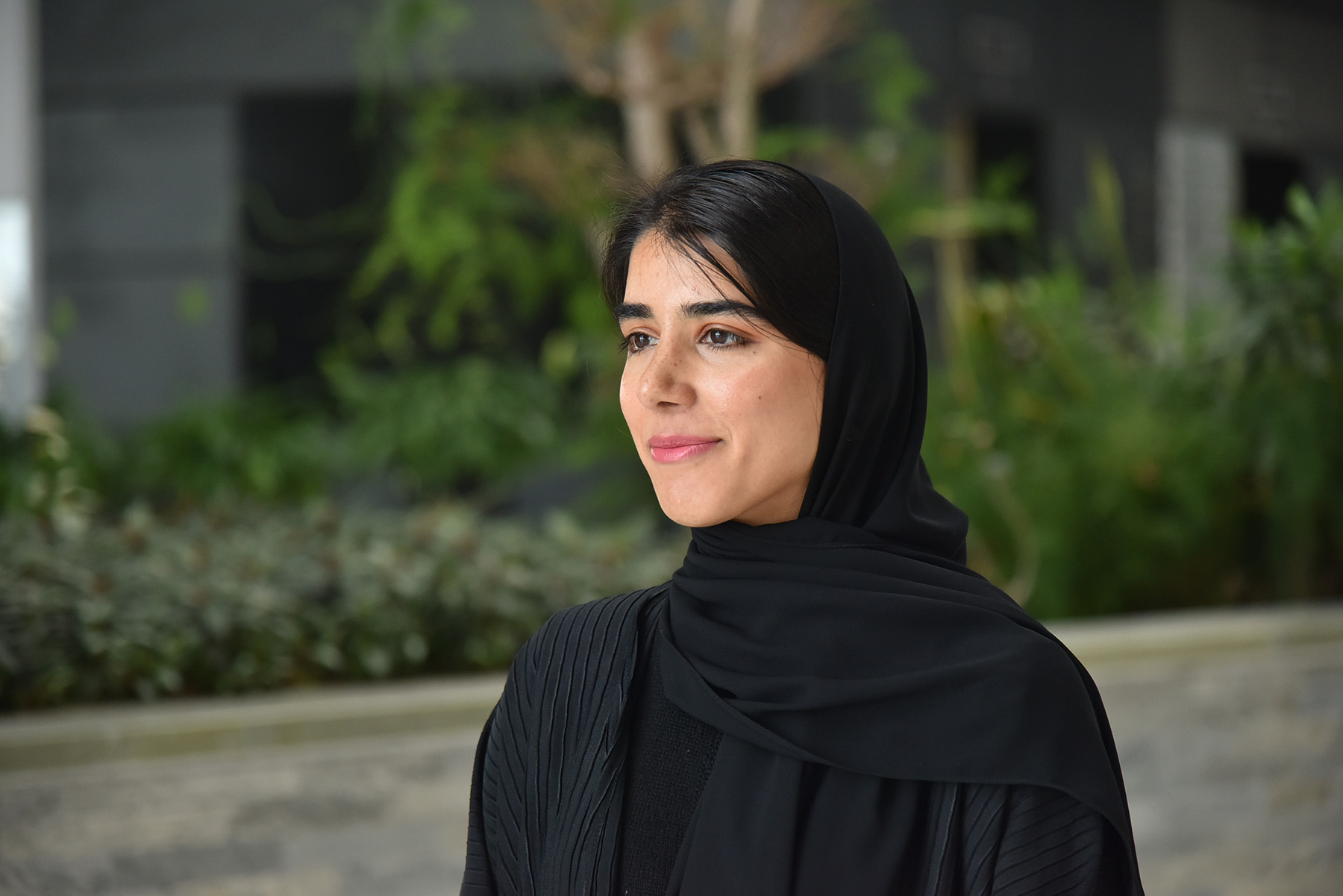
When asked about her specific part in this, Aisha says: “My role was defined when I was approached a year ago by a Qatari girl on the streets of London, who told me that I inspired her to sign up for her 10k run”. Nothing can compare to the motivation of such a simple yet joyful encounter, and Aisha hopes “to be a leader for other women and girls to break out of their own shells”.
Planning her next adventures, Aisha is looking to capitalise on her unique experiences to advocate and raise awareness for vital causes in often marginalised communities. One of her most recent trips was to Mount Elbrus in Russia, the highest peak in Europe, as part of a partnership campaign with Qatar’s Ministry of Public Health to raise awareness around mental health.
Aisha says she’s been blessed with the support and encouragement of her family and friends. But her self-motivation and strong set of personal values stand out as a shining example to others of what one can achieve.
And, in a virtuous circle of empowerment, she constantly draws motivation from those around her: “I tend to notice the characteristics of different people that resonate with me. I then use those as a source of inspiration to make myself better every day”.
Ask any new mother, and they will admit that having a child – while one of life’s most rewarding experiences – can be daunting, confusing, and exhausting. These are feelings only heightened by the challenge of balancing other priorities like family, work, and education.
Rawan Hasanain gave birth to her first child Aliaa just two weeks after graduating from Qatar University. She subsequently worked full-time for the first two years of baby Aliaa’s life.
She remembers this as an understandably challenging period, despite the enormous support offered by her husband and family. “Being pregnant in my last year of college wasn’t an easy task”, she says. “To get everything done and manage all tasks, I needed to follow a clear structure in which most days were planned well ahead of time”.
It was during this time that Rawan decided to create an Instagram account for other new mothers. She says that while there are many fantastic events and learning opportunities in Qatar, mothers are often unaware of them. Through the social media network, Rawan can update her growing community on various classes and opportunities while sharing her own knowledge and experience first-hand.
To ensure the platform stays useful and informative, Rawan draws on guidance and tools offered by initiatives such as Qatar’s Women’s Wellness and Research Center. The Center was an invaluable support system to Rawan as she learnt about things such as breast feeding and first aid. She now works hard to build and maintain relationships with specialists and educators.
Rawan has also introduced followers to the advantages of public spaces like the Qatar National Library – “another great national institute offering a haven of activities for both mothers and children, like reading and music classes”.
“I have benefited from many amazing health, education, and awareness initiatives because of Qatar’s clear vision of investing in health and education”, she says. It is because of this vision, Rawan suggests, that Qatari women feel encouraged to occupy senior positions across government, education, and business.
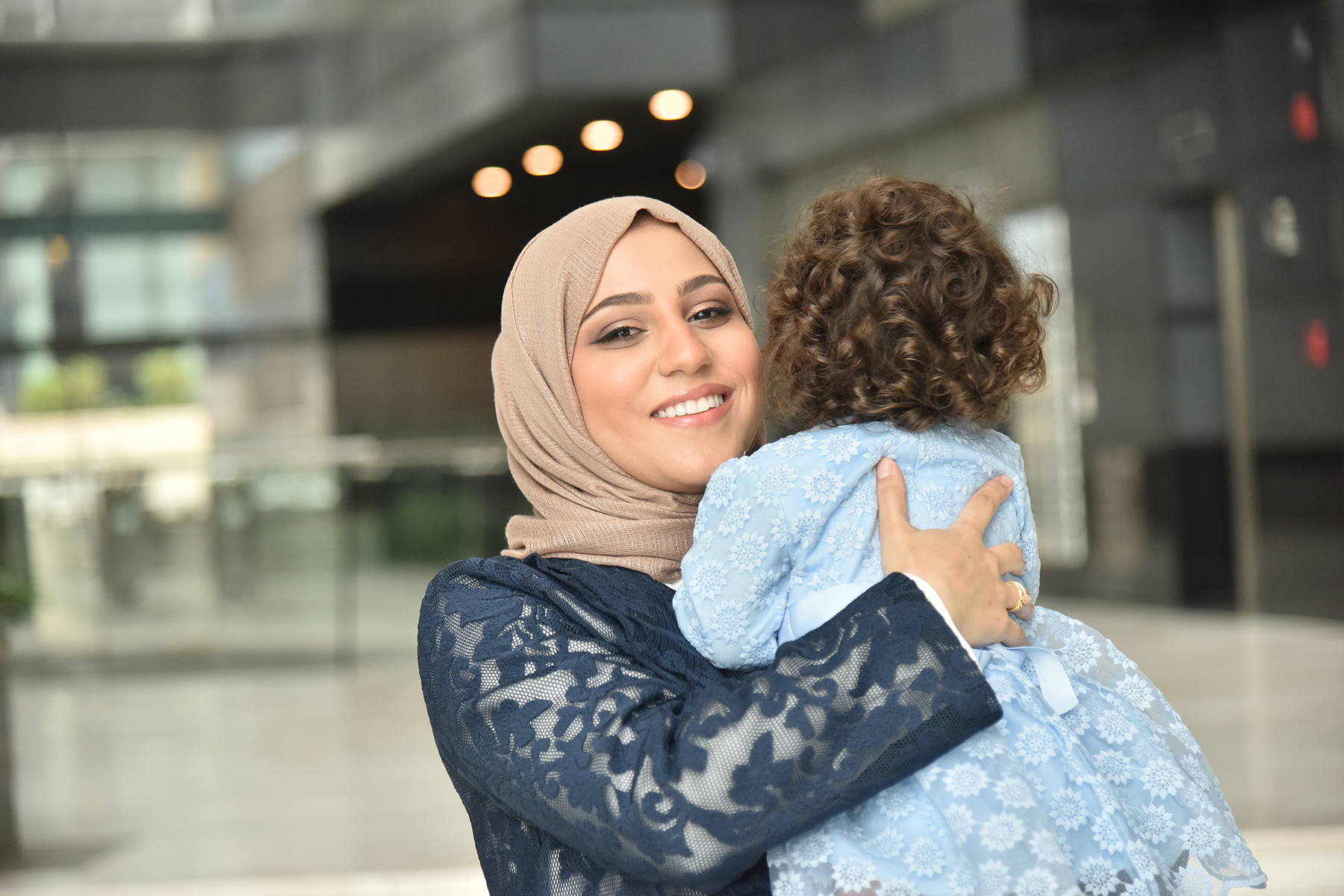
It was also because of this vision that Rawan felt compelled to give back to her community. She now works with the admirable objective of “building a generation of conscious and cultured mothers by presenting them with the information needed to raise healthy children – physically, psychologically, and mentally”.
One – perhaps unintended – benefit of Instagram has been the supportive and engaging community Rawan has fostered. Her initial motivation was simply to give back by helping improve the lives of mothers and their children. But as the account has grown, her followers are now contributing with their own words of encouragement and titbits of advice.
When asked who she is inspired by – aside from her online community, of course – Rawan points to Her Highness Sheikha Hind bint Hamad Al Thani. She believes Her Highness has paved the way for Qatari women as they seek to balance motherhood, while having a meaningful impact on society.
As the founder and CEO of Knockout Boxing, the first female-only boxing studio in Qatar, Maha Al Ansari is passionate about making sports more accessible to women.
“I have always had a dream of contributing to the evolution of fitness in Qatar – specifically for women”, she says. “I recognised that it was harder for women to find a comfortable space to work out that is of the same standard as the men’s or mixed gyms in Qatar”.
She credits sport as a driving force in her life – Maha set up Knockout Boxing out of a desire to contribute to the promotion of a healthy and active lifestyle, in line with Qatar’s 2030 National Vision.
She explains: “Through Knockout, I aspire to help motivate and encourage women of all ages to make exercise not a one-time activity, but a part of their lifestyle. One of the main missions of Knockout is to raise awareness of both the physical and mental benefits of fitness.”
Entrepreneurship is not the only string to Maha’s bow, however. She began her career at beIN MEDIA GROUP as the first Qatari to work in the English production department. She holds a degree in sports journalism from Northwestern University in Qatar and was voted Valedictorian of her class. And she has twice been awarded the Excellence award by His Highness the Amir, Sheikh Tamim bin Hamad Al Thani.
“The fact that my country both recognises and commends excellence in education is a great feeling and provides me with an incentive to always work and give back to my community”, she explains.
Maha appreciates the opportunities that Qatar has offered her, particularly as a young female entrepreneur. Investment in education through world class institutions has, in her own words, “contributed immensely to the advancement of opportunities for women and fostered an environment where women are able to significantly contribute to society”.
Indeed, greater gender equality in Qatar has allowed Maha to pursue her dreams without any restrictions.
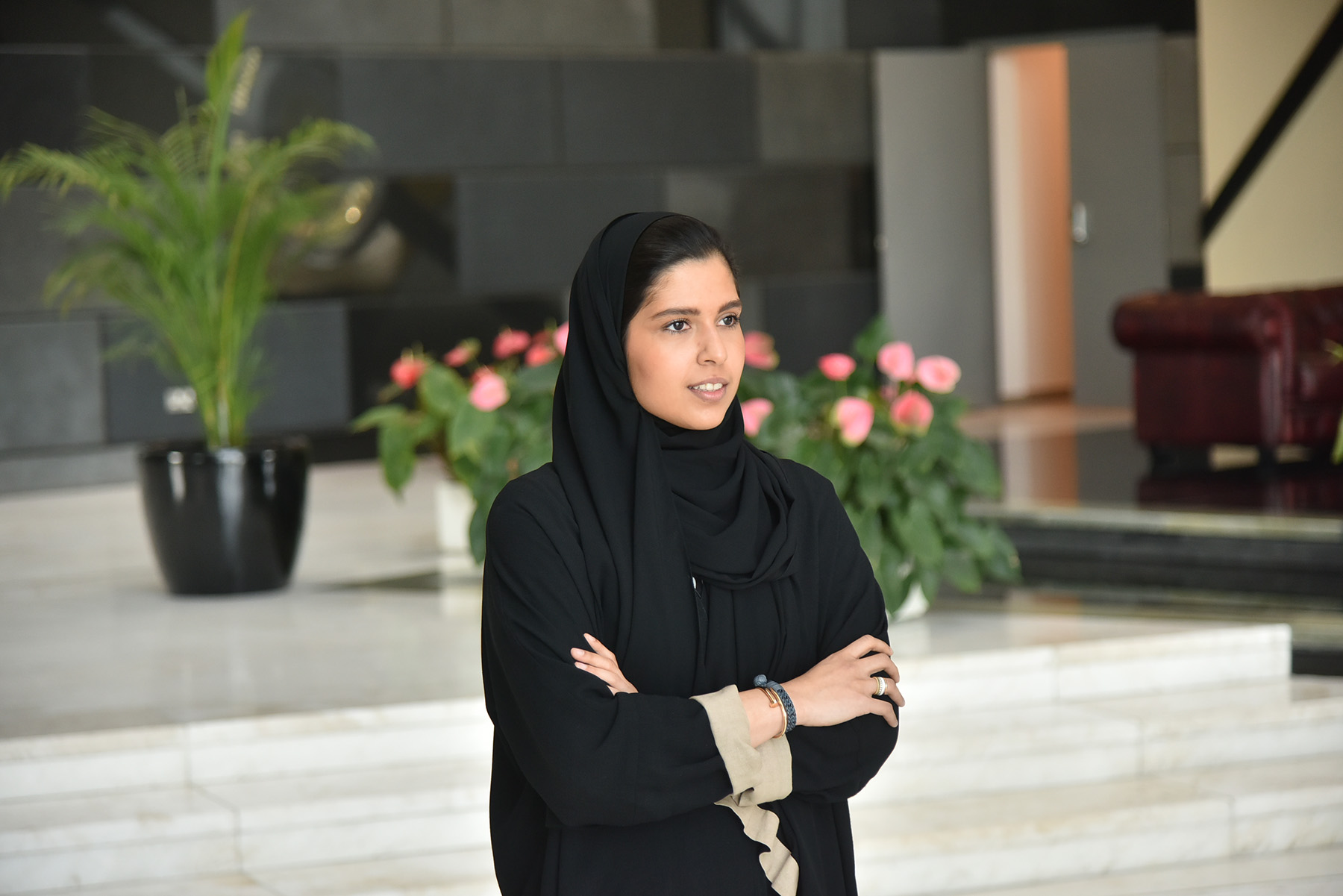
When asked what her biggest challenge has been, she replies: “Becoming a young entrepreneur, I quickly learnt that a big dream is great to have but the reality of executing it can be extremely challenging. From dealing with government and legal paperwork, to the day-to-day operations of the gym, I was constantly faced with new challenges.”
Looking back on her journey, Maha says that she is “extremely proud to have done this all by myself” but recognises that having the right support system is one of the most important factors in achieving goals. She modestly credits her success to the support of her family, friends, colleagues and mentors who pushed her to achieve bigger and better things.
For Maha, this is just the beginning and she is excited to continue learning and growing in the future. “I truly believe that we as Qataris are the luckiest citizens in the world due to the immense opportunities that our country gives us throughout our lives”, she enthuses.
Q Magazine uncovers how Qatar, now more than ever, is the place to innovate, create and cultivate new ideas.
Fab Lab (short for Digital Fabrication Laboratory) turns ideas into reality using cutting-edge technology and shared knowledge. Fab Lab aims to spread awareness about the growing local capabilities available in Qatar through prototyping using 3D printing and other new technologies.
At the heart of this future-looking venture is a small-scale workshop which provides a supportive environment for creativity and aims to enable everyone, from young people to seasoned entrepreneurs, to advance their ideas and turn them into projects. Fab Lab provides the latest tools, equipment, and manual and digital manufacturing devices, helping reduce the costs of invention.
It is innovation in action. ‘We open the space for everyone, whether they are technology experts or not,’ says Robert Garita, Fab Lab Manager. ‘You can come here and develop your ideas, using different techniques and machines. You can prototype something and move to the next stage of innovation. We are working closely with entrepreneurs, private companies, and students alike.’
He explains: ‘If you have an idea and you want to get it to market, you have to first prototype it. Then you can go to the market, validate your idea, and turn this into a business.’
“We equip and empower the young generation with a new skill-set to foster innovation and their ability to make things” – Nayef Al Ibrahim
He shows an example of a prototype of jewellery, holding up an eyecatching Arabic ring to catch the light. Its fine detail and intricate design look as if it were the product of a traditional artisan, and yet it has been made by a 3D printer at Fab Lab from resin.
Designers came to Fab Lab with an idea for the ring, which they needed to refine. ‘We took the 3D model, and then printed it, first using plastic, and then using resin,’ says Garita, a Costa Rican architect specialising in digital fabrication and social innovation. ‘The designer was able to then discuss this with the client and customise the product, before beginning mass production. In this case they are going to cast it in gold, so they have to get the design right at the outset.’
Now with Fab Lab you can be a ‘pro-sumer’ – a producer and consumer combined. He says: ‘This is changing the economy. We need spaces where you can prototype an idea, get more precise information and fine-tune the design, and then bring this to on-demand production.
‘Fab Lab is a call to action that turns us from the consumers of technology, through gaming and phones, to applying technology to turn us into producers. It is the fourth industrial revolution at work.’
This will result in more environmentally friendly manufacturing, he believes. ‘You are making something for your needs, not taking something from the market that is pushing you to consume. Technology is just a tool, not the final goal – it will allow us to make customised products that will change the way we consume.’
The beauty of the Fab Lab concept is about more than technology, he says. ‘When you have a collaborative space, people from different backgrounds, where you can work with biologists, engineers, designers in the same place, that is a huge change.
‘If technology is not open to the people, there is no social innovation. What I love about Fab Lab is that it gives people the opportunity to play with the machines, learn from others, and produce something unique.’
He adds: ‘Qatar is a wonderful environment for innovation because it brings so many experts from different fields together. Fab Lab will allow the nation to produce what it needs.’
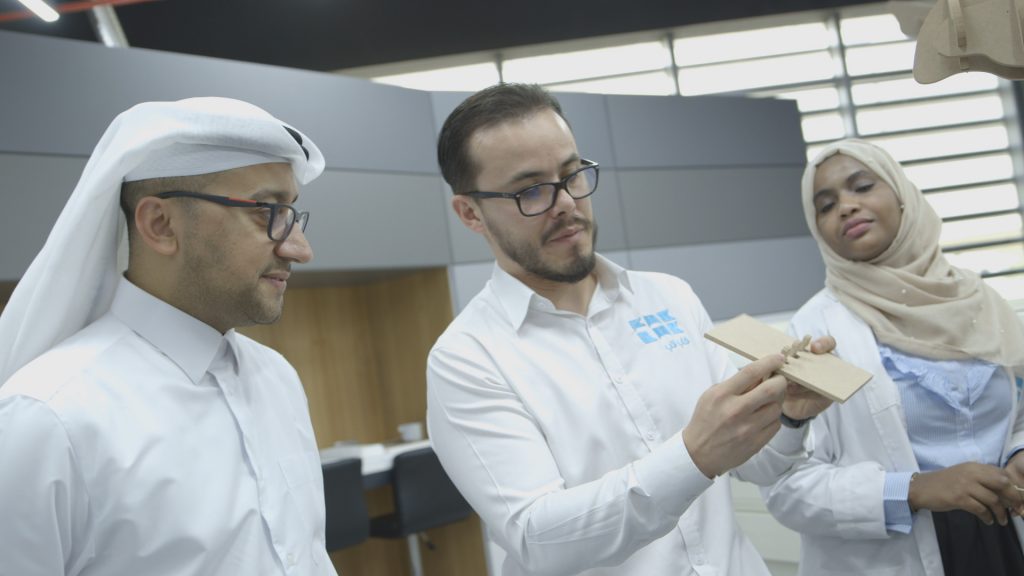
Fab Lab is part of a network of 1,500 around the world, providing a global community for inventors. QBIC Fab Lab, funded by Qatar Development Bank and managed by Qatar Business Incubation Centre’s incubated startup, ibTECHar Digital Solutions, is the first incubator-based fabrication laboratory in Qatar.
QBIC Fab Lab is a small-scale workshop that provides entrepreneurs and inventors with a wide range of state-of-the-art computer-controlled tools and programmes that help them digitally fabricate products and prototypes.
Nayef Al Ibrahim, ibTECHar founder and a civil engineer, says: ‘We provide integrated, solutions-focused education. We bring content, technology and people, and we operate spaces. ibTECHar in Arabic means innovation – to be innovative. We believe technology empowers human beings.’
He has a clear vision: ‘We equip and empower the young generation with a new skill-set to foster innovation and their ability to make things. In the long term, we believe this will contribute to our growing diversified economy. Qatar is blessed with the resources we need, so we have a unique and huge opportunity. This is an exciting time to be a young person in Qatar.’
It is not your average day in the office. When the Director General, His Excellency Khalifa bin Jassim Al Kuwari, oversees the work of Qatar Fund for Development (QFFD), he meets recipients of Qatar’s foreign aid all over the world.
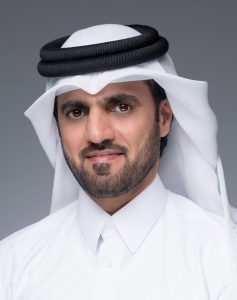
They are the beneficiaries of Qatar’s foreign aid programme, established in 2002 to deliver the nation’s development pledges and commitments to other countries.
QFFD’s work started in earnest four years ago, when dedicated resources were allocated to help Qatar tackle some of the world’s most pressing humanitarian and development challenges.
HE Mr Al Kuwari says: “QFFD’s mission is influenced by Qatar’s steadfast commitment towards spreading hope and promoting peace and justice through sustainable and inclusive development.”
Historically, Qatar has been a generous donor and its aid has reached many countries all over the world. In 2016, QFFD’s contributions reached USD 507 million, while in 2017 this increased by nearly 33%, to USD 674 million.
HE Mr Al Kuwari says: “Today our aid reaches over 80 countries in the form of grants, concessional loans, and technical assistance. For next year, QFFD has already signed agreements with partners and will be working in eight new countries.
“Our primary focus is to support human development by improving education and health systems and promote sustainable economic development initiatives geared towards strengthening communities’ resilience by creating jobs and improving workers’ skills.”
He adds: “Over the past four years, QFFD has been able to reach more than eight million direct and indirect beneficiaries in more than 80 countries. During that time, QFFD has developed various partnership models with national and international NGOs and multilateral organizations to ensure that its funds are efficiently used in targeting communities and individuals.”
The partnership with the Bill and Melinda Gates Foundation is a case in point. In 2016, QFFD pledged USD 50 million to establish the Lives and Livelihood Fund (LLF).
An innovative financing mechanism, it aims to raise USD 2.5 billion over a five-year period, offering soft loans that promote human development, healthcare, and agriculture in the world’s least developed countries.
QFFD has also developed an initiative with several national NGOs and international partners to provide Syrian children affected by the war with access to education.
Qatar Upholding Education for Syrians’ Trust (QUEST) has implemented 13 projects so far, totalling USD 80 million and helping 400,000 students.
And in Tunisia, Qatar has established the Qatar Friendship Fund to support development. The fund, which partners with leading Tunisian micro-lending financial institutes and local NGOs, is helping create jobs by building businesses.
It is seeing these projects in action that gives HE Mr Al Kuwari his greatest sense of achievement. He says: “Each time I visit QFFD projects abroad there is an indescribable feeling of accomplishment in seeing that our work has supported students, teachers, parents, fishermen, and civil servants who live thousands of miles away from us.”
There is one project that stands out. He says: “Out of all QFFD projects, our work in Darfur has inspired me the most, as it is a concrete embodiment of what QFFD stands for.
“In Darfur, violence has forced people to abandon their homes and livelihoods, undermining the production and supply of food, resulting in acute humanitarian needs. In addition to the protracted conflict, natural hazards such as floods and droughts exacerbated the situation.”
The Reconstruction of Darfur Program is designed to support displaced persons’ return to their hometowns. It builds trust in a future based on security and stability, preventing the return of violence.
Model Service Centres have been built in five villages in Darfur targeting 150,000 people. They include a water station, health centre, primary and secondary schools, police station and a mosque. Through providing educational opportunities, health services and promoting the rule of law, these projects have had a profound impact on local communities, often influencing people’s decision to return to their villages after so much destruction.
Affordable social housing and space for establishing micro-enterprises, will form the second phase of this work, providing sustainable livelihoods for locals.
HE Mr Al Kuwari says: “I am very proud to see QFFD grow to what it has become today. A few years ago, there were only three of us in the office, and today we have nearly reached 50 employees. We still have a long way to go, but I am certain that we are on the right track.”
There are luscious boxes of organic vegetables, freshly pressed juice, home-baked pastries, and raw milk produced on a farm in Qatar. As far as the eye can see, delicious produce is piled high.
Welcome to Torba Farmers’ Market, the latest arrival on the Doha social scene.
A riot of colour, Torba is a community-inspired farmers’ market hosted by Qatar Foundation at Education City. It has rapidly become the place to be seen in Doha.
It has humble roots, however, according to founder Fatma Al Khater. “People in Doha had lost their connection to food,” she says.
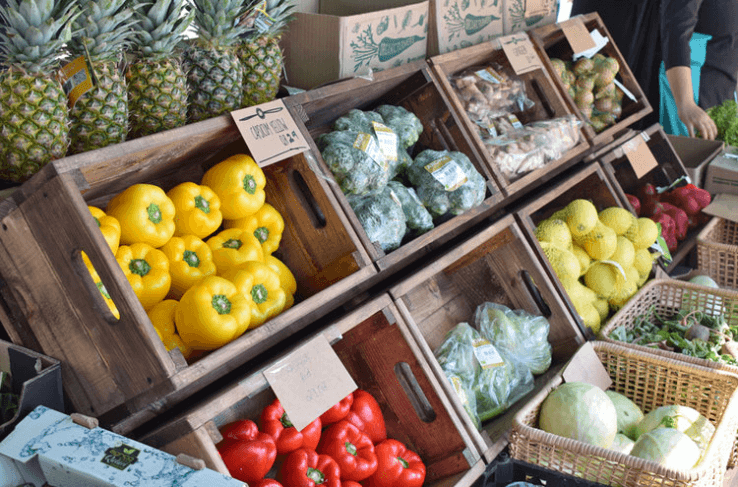
A Danish baker comes with pastries she has baked through the nights and trays of fresh sourdough bread.
Green juice of the day, made from sparklingly fresh spinach, pak choi, kale or moringa picked at 6am, is ready by 9am for the hordes of mothers with young children, students, and residents who visit the open-air market.
At the ‘farm table’, local chefs cook seasonal dishes with the Torba food, while the aroma of freshly-ground artisan coffee lingers over the stalls.
Regulars include Mama Baba Ganoush, Superheroes Eat Plants, and Greenola. There are seeds and seedlings on offer for those ambitious enough to grow their own food at home.
The name ‘Torba’ is derived from Arabic. It means ‘the pure soil that feeds, nourishes and nurtures’. Health is a priority – the juices and vegan bakes on offer would not be out of place in California.
For a country known for skyscrapers, big cars and sand dunes, Torba Farmers’ Market has become the hip alternative weekend spot for residents. It also gives visitors a chance to sample handmade and local food and experience a slower pace of life.
Fatma is particularly proud of the stall selling Kanar Crumble, made by local producers from the fruit of Qatar’s national tree. Rather like small apples, they contain more vitamin C than any citrus fruit.
She says: “We have the limitations, obviously, of the desert, but we have forty kinds of home-grown produce, and more is appearing all the time.”
The food is grown on organic Qatari farms, certified to maintain the highest standards.
“We are able to sell raw sheep, goat and cow milk, alongside camel milk. We have free-range chickens fed from pastures in the farm so that they produce what we call ‘golden eggs’, which are extra-nutritious,” Fatma says.
“Our lettuce is grown in the open, and we have rainbow colour carrots, delicate purple aubergines, and exotic dinosaur kale – all homegrown. I am very proud to showcase this, some of which comes from my own family farm passed on to us by my grandfather.”
It is a growing movement – people will visit the organic market to tell Fatma “we have a farm”, and say that they want to contribute too. So, the market is a true community initiative, growing organically each month.
A formidable force of nature herself, Fatma began planning the market two years ago. It opened at the end of 2017. “Health and safety inspectors wanted the food to be packaged, and I had to explain that people wanted to buy it loose in paper bags. We have a zero-plastic philosophy, but that required a change in mindset.”
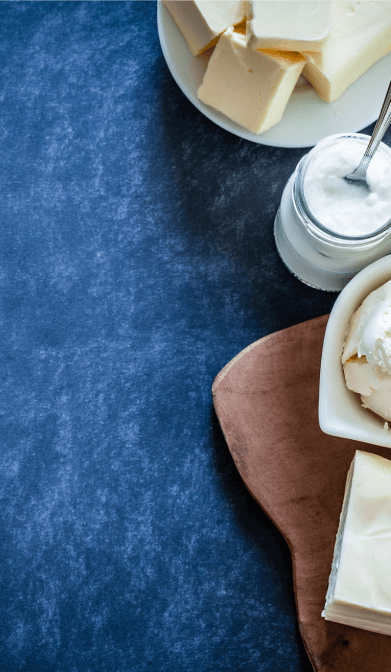
In July 2017, His Excellency Mr Mohammed Abdullah Al Rumaihi, Minister of Environment and Municipality, said he expects Qatar to be 100% self-sufficient in vegetable production by 2020.
Since then, Qatar has established four agriculture projects, which will enable Qatar to produce 80,000 tonnes of fresh vegetables and fruits annually.
More than 500 greenhouses, with a total area of 280,000 square metres, have been added to the existing capacity of local farms between July and November 2017.
Reusable hessian bags are the order of the day, together with recyclable containers.
The market is also working to become zero waste, with any excess food used as compost.
It is satisfying work. Fatma says: “The public in Qatar is really passionate about this. Being a sustainable, healthy nation is so important, and buying and cooking food straight from the ground is incredibly rewarding. The market has been greeted with such enthusiasm, it has been a joy to see.”
Fatma Al Nuaimi has one goal: to deliver the most amazing FIFA World Cup the globe has ever seen. As the Communications Director at the Supreme Committee for Delivery & Legacy (SC), she has a singular focus and a long-term vision.
“We want the 2022 World Cup to be remembered as the best tournament, but we also want to set the benchmark for how major sporting events deliver real social and economic legacies long after they have finished,” she says.
Al Nuaimi stepped into her role in early 2017 and proudly admits her first year was momentous.
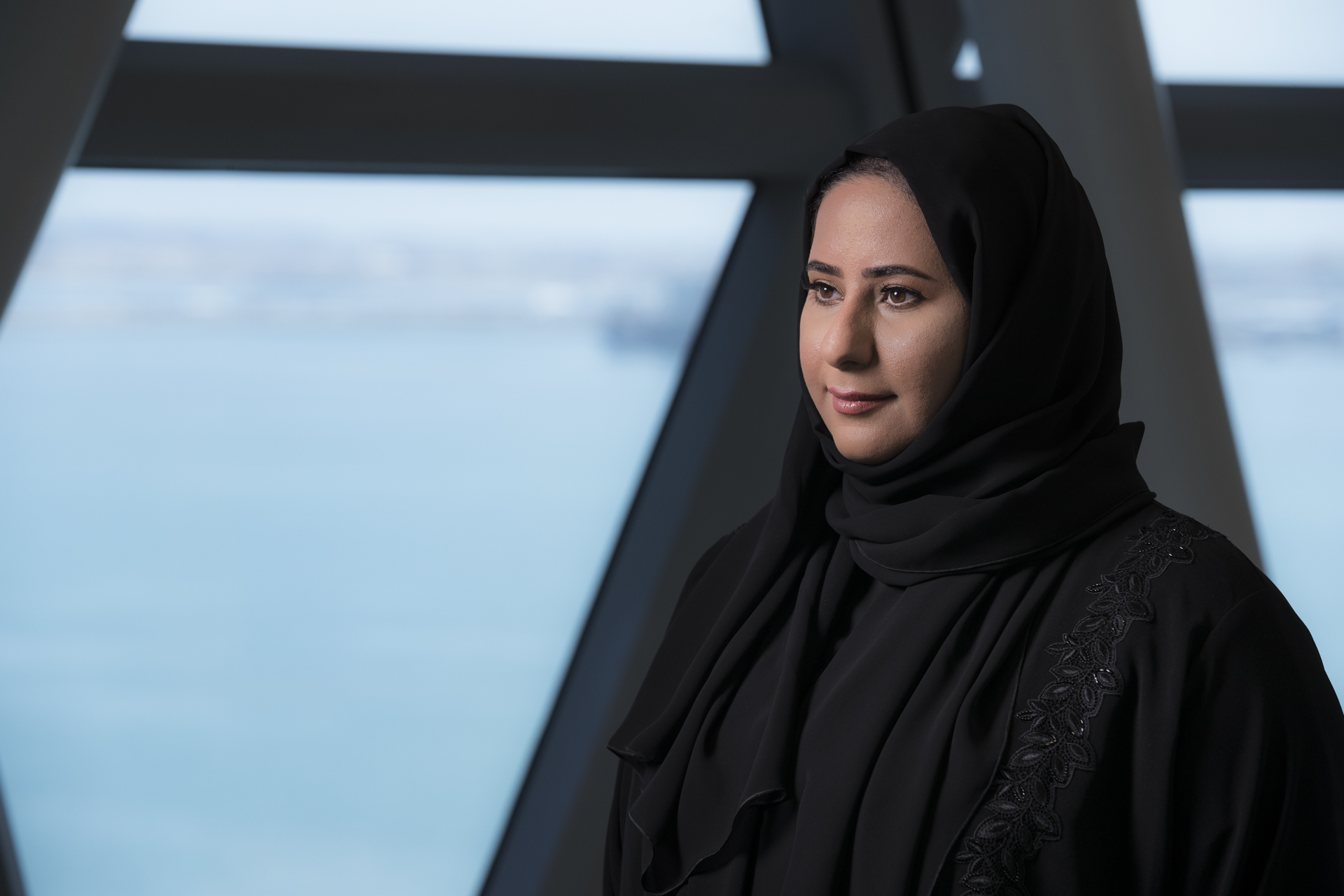
“Highlights included launching Khalifa International Stadium in front of 48,000 fans at the Emir Cup Final in May 2017 and unveiling the designs of Al Thumama and Ras Abu Aboud stadiums to the world,” she says.
There have been challenges too, of course. “When the blockade began in June 2017, we all had to adapt to a new way of working,” she says. “I am really proud of the way my team, the organisation, and Qatar as a whole adapted to the blockade.
“It brought out the best in us, reflecting our solidarity, unity, and integration. Our contingency plans helped us to move on, find alternative routes, and continue our construction projects as scheduled.
“We’ve all shown such resilience in the face of adversity and it’s made us all the more determined to deliver the most amazing FIFA World Cup the world has ever seen.”
The SC team is made up of over 400 employees from 52 different nationalities, so it is an exceptionally diverse workforce.
Women will also be centre stage in the Qatari World Cup effort, she explains. “Qatar is keen to empower women through encouraging them to excel and succeed in any discipline,” she says. “Qatar has always had strong inspirational female role models.”
The 2022 event will also notch up a number of ‘firsts’, she says. “This will be the first World Cup for an Arab state and the first World Cup in the Middle East. We can’t wait to welcome the world to look at the region for reasons other than conflict and dispute.
“Tournament-wise, this will be the first ‘compact’ World Cup in history, meaning the longest distance between stadiums is only 55km and fans will be able to watch two live matches in one day.
“We want to create an Olympic Village atmosphere in and around Doha, which hasn’t been done in a World Cup before. I am an avid football fan and can’t wait to see the world’s best players take to the pitch in some of our unique tournament venues.
“Watching a semi-final at Al Bayt Stadium in Al Khor is going to be a special moment for me as it’s by far my favourite stadium design and a project I have been involved with since the start.”
But it is when the sports events finish that Al Nuaimi’s real work begins. “Legacy has always been central to Qatar’s World Cup plans – so much so that the word ‘legacy’ is in the name of our organisation,” she explains. “When we bid for 2022, we did so on the promise that we’d leave a meaningful, measurable legacy in Qatar and around the world.
“An obvious example is how hosting the World Cup is helping to deliver Qatar’s National Vision 2030 by accelerating infrastructure projects across the country. Projects like the HIA airport expansion, Metro project, and road network expansion are all upgrades that will benefit Qatar for generations.”
The transformative impact will not stop there, however. “We also wanted the region to benefit from the opportunities – social and economic – that hosting a World Cup can bring,” she says. “At a time when global dialogue is emphasising cultural differences rather than similarities, we believe the 2022 FIFA World Cup in Qatar can utilise football’s ability to bring people together.”
In February 2018, the SC inaugurated the SC Tree Nursery, a project to grow the turf required for the 2022 FIFA World Cup™ stadiums and the trees that will fill the green spaces surrounding them. This venture, the first of its kind in the region, will also leave a rich environmental legacy.
She adds: “For me personally, legacy means shaping a rich and beneficial history that is engraved in people’s hearts and minds forever. I truly believe that, when it comes to major global sporting events, the 2022 FIFA World Cup in Qatar will set the benchmark for legacy and leave a lasting impact long after the last ball has been kicked on 18th December 2022.”
Founded by the Qatar National Research Fund (QNRF), QES uses innovative space exploration technology to expand the known universe and discover new exoplanets – planets that orbit stars other than the sun.
In 2010, QES’ base in New Mexico discovered a new exoplanet, named Qatar-1b. This was followed by a second exoplanet in 2011 and as of 2017, QES has identified five previously undiscovered exoplanets.
In addition to helping humanity charter the universe, Qatar is also pursuing advances in the field of space monitoring. This includes launching Qatar’s first independently operated satellite in 2013, Es’hail 1. This satellite was the first step in a mission to develop a sustainable national satellite industry, and Es’hail 2. is expected to launch in 2018.
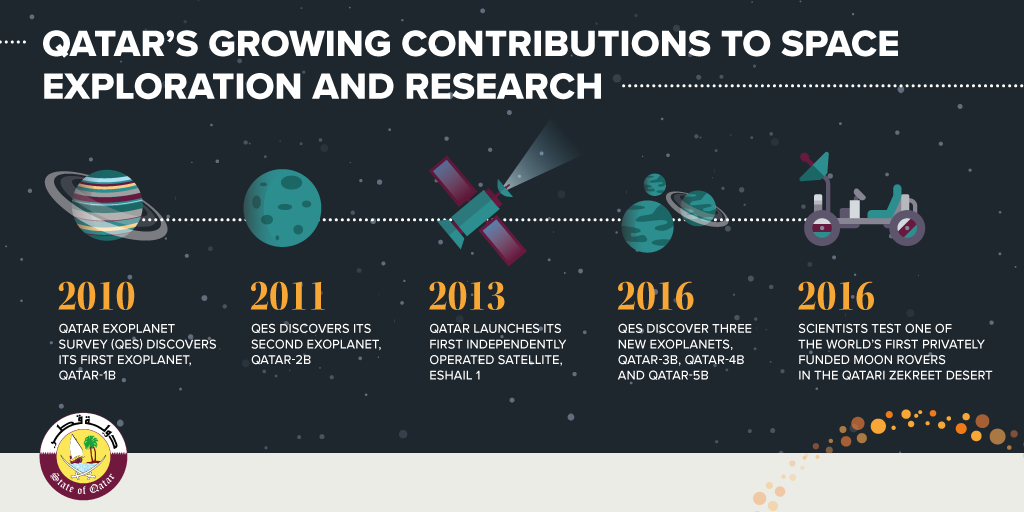
Closer to earth, Qatar has also opened up its unique terrain for testing innovative space exploration technology. The terrain of the Zekreet Desert resembles in many respects that of the moon, and Qatar recently welcomed scientists to trial one of the world’s first privately-owned moon rovers.
As scientists across the world continue to push further into the unknown, Qatar is determined to play its part and be a driver for progress and discovery in the field of space research.
As CEO of the Qatar Financial Centre (QFC) Authority, Yousuf Mohamed Al Jaida is responsible for the success of the QFC in supporting Qatar’s economic goals.
“Our objective at the QFC is to diversify the economy and position Doha as the region’s leading financial and commercial capital,” he says.
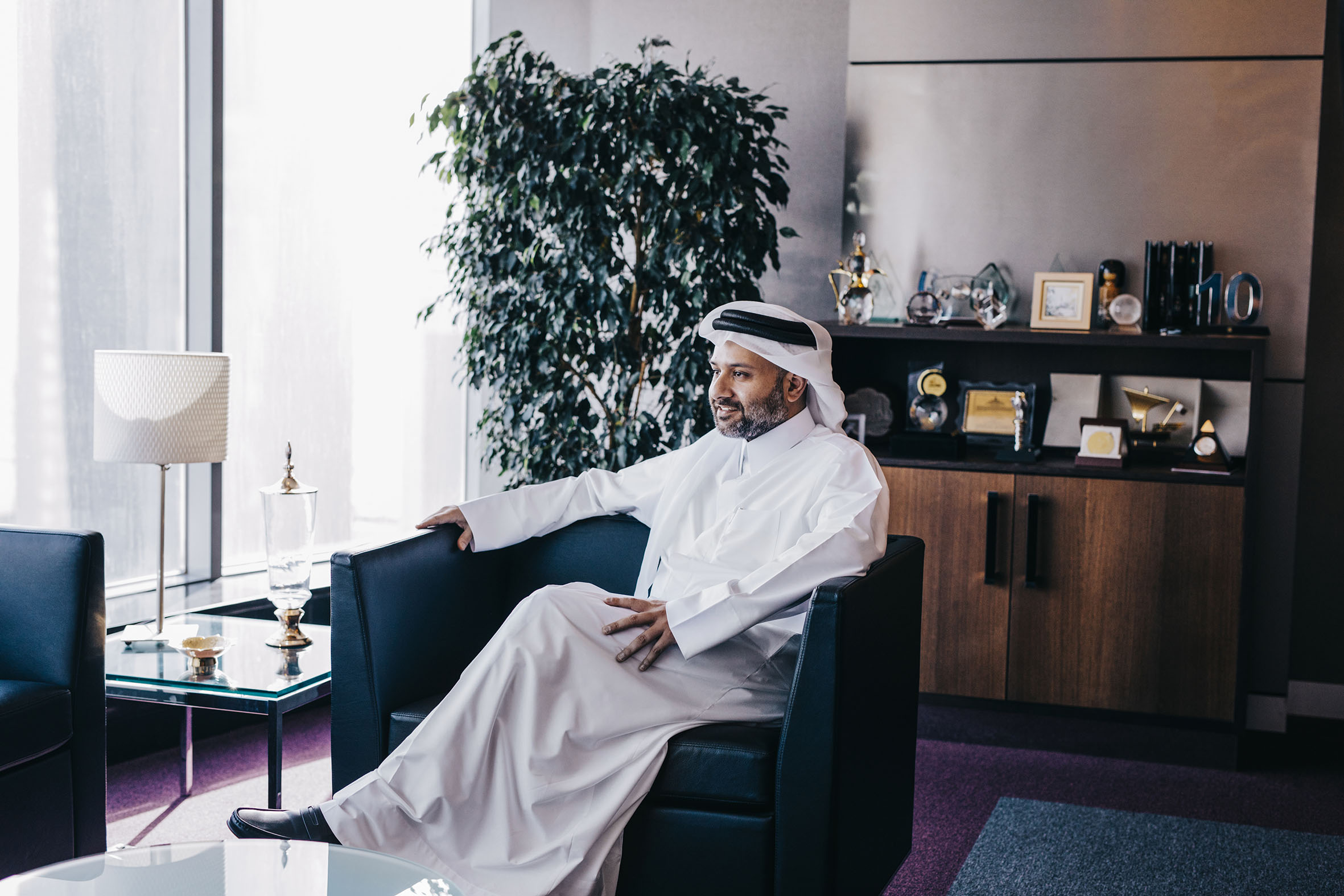
One way that the QFC contributes to the expansion of a strong private sector is by providing a comprehensive framework for firms to do business in Qatar and the region. This encourages local and international investment, helping to create jobs and opportunities.
The 2022 FIFA World Cup, to be held in Qatar, has accelerated this aspect of the QFC’s work. The QFC will provide the necessary legal, regulatory, and financial support to local and international firms working on projects related to the tournament. This enabling framework is an essential part of Qatar’s journey towards economic maturity, diversity and sustainability.
However, Yousuf’s job does not end there. The QFC is here to support Qatar’s economy for the long term. As he points out: “Qatar’s plans for economic diversification and human capital growth pursuits are well enshrined in the Qatar 2030 Vision.”
Leading such an important organisation can be a daunting challenge at times. When an illegal blockade was imposed on Qatar in the middle of 2017, there was more pressure than ever on the QFC to ensure Doha remained a good place in which to do business.
Yousuf did not shy away from his task. Thanks to a series of economic reforms implemented by the State of Qatar in response to the blockade and the hard work of his team, 2017 was the Qatar Financial Centre’s most successful year on record.
He says: “2017 was the fastest growth period in the QFC’s 13-year history since its establishment in 2005. We recorded a 66% increase in new firms being licenced on the QFC platform in 2017 compared to the year before.”
This is something that Yousuf is especially proud of. He says: “As I reflect on the year that has passed, I look back with immense pride at everything our team has accomplished. Our success this year is best shown by our record growth.
“The way our nation and our entity stood up to the challenges of the blockade has been truly inspiring and will always be a proud moment in my career.”
For Yousuf, the future for Qatar and its economy is bright. He concludes: “I see Doha being a leading business and financial capital by 2022.”
One of the most rewarding parts of Dr Sohair Wastawy’s job is to stand by the door of the new national library. She likes to watch the awestruck look on visitors’ faces as they see the magnificent building for the first time.
Indeed, as Executive Director of the monumental Qatar National Library (QNL), a member of Qatar Foundation, Dr Wastawy oversees a world of dreams.
“The first time I walked through the building, I could tell this was going to be more than just another library,” she says. “It’s an incredible building, designed by the famous architect, Rem Koolhaas, and it has a very different feel from a traditional library.
“The moment you walk in, you can see a panoramic view of the entire library, with all of its possibilities, all around you. The light surrounds you and gives you a feeling of warmth. It is very rewarding to stand by the door and see the look on the faces of those entering the library for the first time: complete awe.”
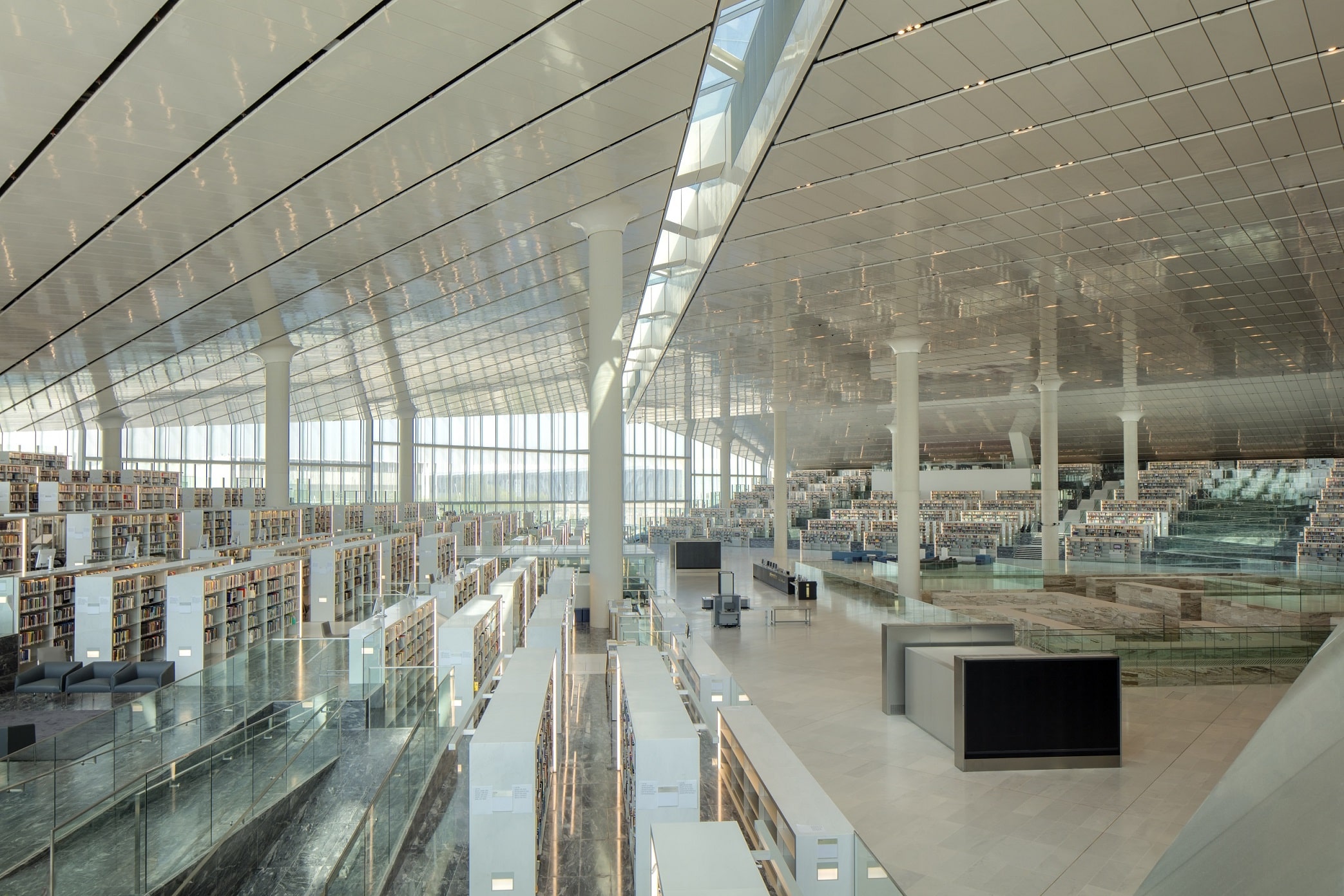
So what makes the visionary new library in Doha’s Education City so different? “Most national libraries are not open to the public in the manner of this library,” explains Dr Wastawy.
“QNL is truly a library of the 21st century. This is reflected in its floor plan, services, collections, and mission. We offer hundreds of public events, from early literacy programmes to knitting groups to orchestral performances. We aim to be central to the Qatari community, not just a place people think of when they occasionally need a book.”
Its mission is to spread knowledge, nurture imagination, cultivate creativity, and preserve the nation’s heritage for future generations.
A tour of the gleaming library reveals a multitude of quiet corners for reflection and an interactive children’s library, full of brightly-coloured toys, alongside treasured heirloom volumes and stacks of academic works.
QNL is truly a library of the 21st century. This is reflected in its floor plan, services, collections, and mission. We offer hundreds of public events, from early literacy programmes to knitting groups to orchestral performances.
― Dr Sohair Wastawy
Public computer workstations, performance spaces, and a cafe complement the world-class literary collection.
The building also houses a world-leading collection of Islamic literature and antiquities, a rich heritage now protected for the nation.
Well-worn first editions of pivotal works sit alongside early versions of European fairy tales and rare Islamic books. You could lose hours quietly browsing the shelves, dipping into old volumes. In contrast, the digital facilities and technology are cutting edge.
An online portal allows users to access the library remotely, while a book club for the blind supports people with visual impairments.
It is truly a library for everyone. Dr Wastawy says: “This is a unique national library that plays three roles: national, public, and research.”
Having spent most of her career in academic libraries where there is a sole mission and a single erudite audience, the breadth of her new role has proved inspirational for the director.
Of course, there have been some challenges along the way. “The most challenging part so far has been working out the details that you only notice once the library is open to the public,” she says.
“We have been planning for this opening for years, working with some of the world’s experts in a range of related fields, but you never quite know how people are going to react. So we’ve had to make some adjustments in terms of space use, event offerings, and so on.
“But these are good problems to have, because they show that our visitors really do care about making QNL their own.”
Since opening in November 2017, the QNL has hosted more than 100 events.
Dr Wastawy finds it hard to pick a favourite. “The early literacy programmes, of course, are wonderful, because you can see a love of reading develop before your eyes in children who are going to enjoy books for the rest of their lives,” she says. “It has also been great to see adults come back and rediscover their own love of learning, whether through book discussions, computer classes, or photography workshops.
“All these events go to show that, deep down, we all want to keep learning—sometimes, we just need the right place to go.”
She adds: “QNL gives Qatar’s community something it has lacked: a welcoming, inspirational place where individuals and families can come to learn together and have fun. Already, we’ve welcomed more than 150,000 visitors, and our members have checked out more than 300,000 books.
“The overwhelmingly positive reception shows that people in Qatar are eager to pursue their educational, creative, and innovative goals, and we look forward to nurturing that passion for generations to come.”
Certainly, it is hard to imagine a job more satisfying.